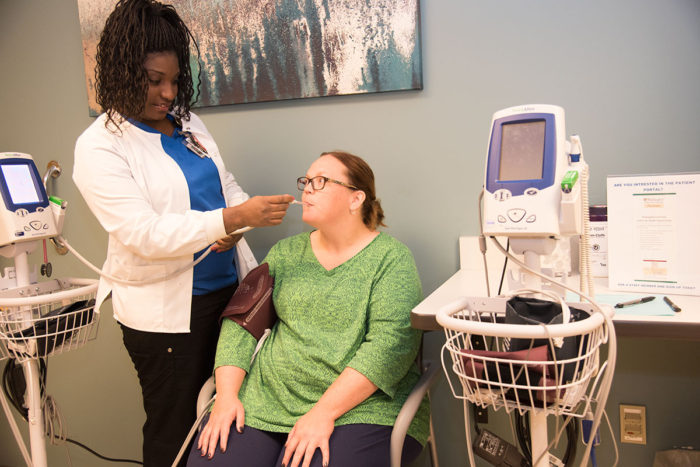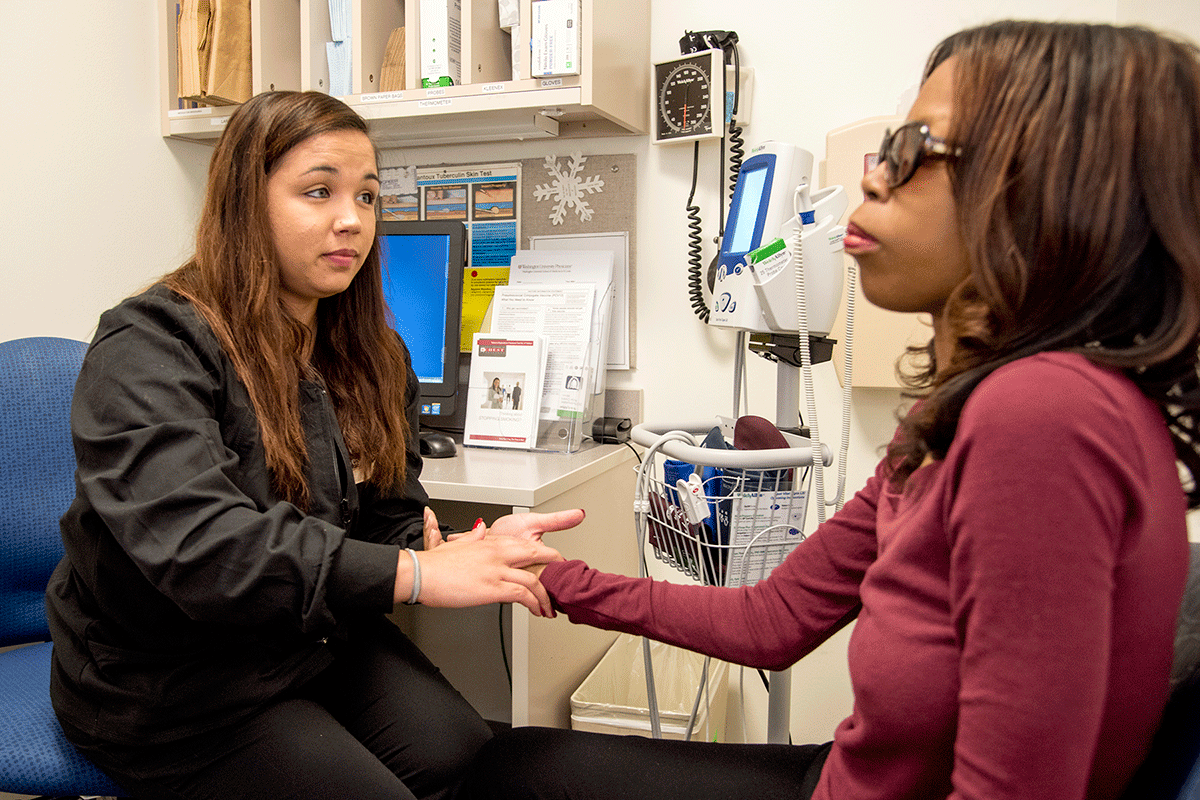Medical assistant program provides opportunities, addresses shortage
Internships doorway to health sciences field for north St. Louis, north St. Louis County residents
 Robert Boston
Robert BostonMedical assistant Adriana Isaac, left, takes the temperature of patient Michelle Petroff in a Washington University Surgical Group exam room at Christian Hospital Northeast.
When Adriana Isaac graduated from McCluer High School in Florissant, she had no idea what she wanted to do with her life. Although she had worked at Pizza Hut through high school and was promoted to manager after graduation, remaining in that job would mean working nights and earning less than $10 an hour.
“I knew the pay wasn’t going to provide for my family, and the hours weren’t working well with raising children,” she said.
During Emily Shanor’s senior year at McCluer North High School in north St. Louis County, she considered becoming a nurse. But after graduation, those plans stalled. Instead, she worked at a donut shop, as a cook at a small Italian restaurant and for a housecleaning business. Often, she juggled two jobs.
“I was lost,” Shanor said. “I had no direction.”
But in July, Isaac and Shanor began new careers as medical assistants, thanks in part to a new internship program at Washington University School of Medicine in St. Louis. The program was created for adults with an interest in health sciences through a partnership involving the School of Medicine, the University of Missouri-St. Louis (UMSL) and St. Louis Community College (SLCC).
Medical assistants — normally trained in the St. Louis area through a handful of trade schools — bring patients into exam rooms, assess vital signs and document the primary reasons for their visits to doctors’ offices and medical clinics.
Medical assistant positions are difficult to fill and recently have become more so because students now have to pass a national certification exam to work in the field. Enrollment in training programs also is low because students find it difficult to attend school for an average of 20 weeks without income. The medical assistant internship at the School of Medicine provides students with an income during training, making the transition possible.
“I couldn’t believe that Washington University would pay me a full-time salary with benefits during an internship,” said Isaac, who now works as a registered medical assistant in pediatric surgery for the School of Medicine. “This program was a life-changer for me and my family.”
The idea for a medical assistant program came out of the university’s interest in supporting some recommendations outlined by the Ferguson Commission. A 16-member board appointed by Missouri Gov. Jay Nixon in November 2014 in the wake of unrest following the death of Michael Brown, the Ferguson Commission issued a report titled “Forward Through Ferguson: A Path Toward Racial Equity.”
During the commission’s work, St. Louis higher education leaders met to determine how they might address some of the issues brought forward during community discussions hosted by the commission. The higher education leaders zeroed in on a need for more economic mobility for residents of north St. Louis County and north St. Louis.
“A key challenge was how best to connect residents with jobs and job training programs that would address the immediate needs of employers,” said Pam Lokken, vice chancellor of government and community relations at Washington University. Lokken attended the meetings of the higher education leaders.
In response, Legail Chandler, the university’s vice chancellor for human resources, and Tracey Faulkner, recruitment consultant for human resources at the School of Medicine, decided to create a paid medical assistant internship at the medical school for unemployed or underemployed residents of north St. Louis County and north St. Louis. They approached peers at SLCC and UMSL for help developing a curriculum and recruiting the first class of 15 trainees.
“We hoped that if we did this training program right, we could change some lives,” Chandler said.
According to Faulkner, the single biggest barrier to getting the training is not having an income. Human Resources leaders asked departments at the School of Medicine to pay the interns an hourly rate during the 26 weeks of classroom and clinical training. “In return, the interns were asked to make a two-year commitment to us after they finished their training,” Faulkner said.
 Robert Boston
Robert BostonDepartments that participated in the internship program included medicine, orthopedics, surgery, neurology and neurosurgery. Each trainee was assigned to a department.
Today, 13 of the 15 interns are working as full-time medical assistants at the school. Fourteen of the 15 graduated from the program, and 14 passed a national exam to become registered medical assistants.
“Together, Legail and Tracey established the curriculum, vetted students and recruited the first class of trainees in a matter of just a few months,” Lokken said. “Their perseverance helped ensure that the first class of medical assistants now is working in jobs across the medical center. The program also is a great example of the commitment of the medical school’s leadership to make a difference in our community.”
Faulkner and Chandler said the program was a successful collaboration of clinical business directors and department specialty supervisors at the medical school, and staff at SLCC and UMSL.
Clinton Fields, director of clinical operations in the Department of Surgery at the School of Medicine, was invaluable in helping the interns.
“Surgery took almost half of them and placed them in different divisions,” said Faulkner, who led evening study groups and provided one-on-one mentoring. “Fields was a great strategic partner for the students’ success.”
As a high school student in Chicago, Fields participated in a program that allowed him to work at Cook County Hospital. He had outstanding advisers and learned about clinical care, pathology and research. While working with the interns in the medical assistant program, he saw himself in some of them.
“I knew that some students came from very challenging backgrounds, but I tried to tell them that with effort, the right attitude and being a sponge for knowledge, they could be successful,” Fields said. “And for many of them, this has been life-changing.”
He said the interns are grateful for the opportunity. “I appreciate the university’s commitment to the community in creating this program,” Fields said. “They could have hired medical assistants who already were certified, but they decided to give an opportunity to those who had not had an opportunity. Without the leadership and support of Jamie Sauerburger, executive director of business affairs in the Department of Surgery, we would have not been able to provide the number of opportunities that we did for our students.”
For Shanor, now a certified clinical medical assistant in the Gastrointestinal Center at the Center for Advanced Medicine, support from her mentors awed her and helped her succeed. “It was no longer me doing it on my own,” she said. “I couldn’t believe the support I received. People I had never met before were invested in my future and dedicated to helping me. I had never had that before.”
Stephen Long, associate vice chancellor of the Workforce Solutions Groups at SLCC, said working on the internship was a rewarding experience. His team helped recruit the trainees and develop the curriculum. “It was great to give most of these students their first opportunity to have a career and to work with an institution like the School of Medicine on an effort that was a great success,” he said.
Long added that he and others at the community college hope the program will become a model for other medical systems.
“At the graduation, it was wonderful to see all the support that these trainees got from their immediate and extended families, and the pride the interns and their families showed was very moving,” Chandler said. “We think there would be great benefit to doing the program again.”
Isaac said the internship has given her a newfound confidence and that she hopes one day to become a nurse. Her health benefits also enabled her daughter to have a much-needed surgery. “I feel very lucky to have a career and work at Washington University,” she said.






